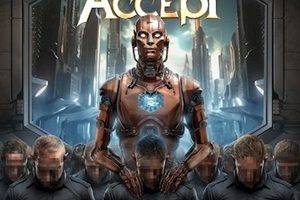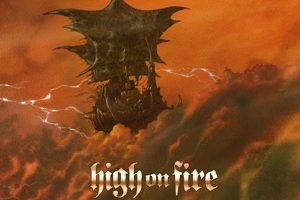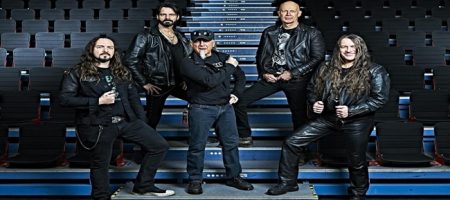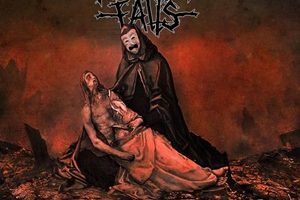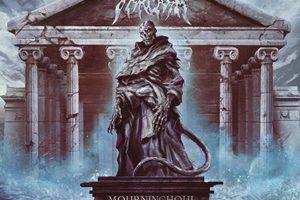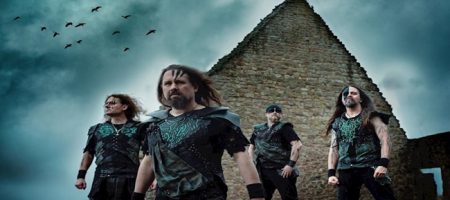Hinayana – Beauty Within Aggression
Thursday, 30th November 2023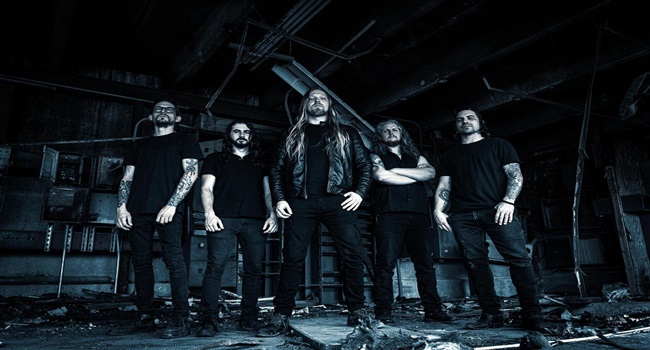
Photo: Jackie Schutza
Continually developing their brand of melodic death metal with modern and doom touches, Texas’ Hinayana arrive at a pinnacle moment in their career for the latest album Shatter and Fall. Advances in technicality, versatility, as well as emotional resonance take place track by track, including some killer guest appearances to add texture to the already cohesive proceedings. We reached out to guitarist/vocalist Casey Hurd to learn more about his childhood music memories, the differences in the latest record versus previous efforts, thoughts on video shoots in the brutal Texas heat, touring challenges, advice he’s received from his father that pays dividends as an artist, and what’s on the horizon for the band going into 2024 and beyond.
Dead Rhetoric: What can you tell us regarding your earliest memories surrounding music growing up in childhood? What were some of your early discoveries when it came to heavier forms of music – and what sparked the interest in picking up an instrument to start performing in bands?
Casey Hurd: My father is a musician, a singer/songwriter – but a country and western swing guy. Some people in Austin, Texas may know the Cornell Hurd Band. There was always music here, equipment around the house. I spent plenty of nights as a kid at honkytonks, here in town, just watching him do his thing on stage. Of course, that style of music was never something I was super interested in, but it was something that was inspiring to see him do as a kid. There was a place over here called Lolita’s and he used to play there every Thursday, that’s no longer here now. I also remember chilling out with him in the recording studio. There were always guitars around the house.
I suppose my brother and I started discovering other forms of music. He was a couple of years older than me. He had an Aerosmith compilation CD that came from somewhere. I liked some of that stuff, I started listening to that music. One year for Christmas I got a drum set, and my brother started on bass guitar. We started getting into AC/DC, Led Zeppelin, all the classics. From there, we both decided we wanted to do guitars instead. I would love to pick up drums again sometime, I just don’t have the room for it now in my apartment.
It was a Saturday we went to record stores on the weekends. I remember one time we had already been into the classics, and I remember we picked up a Metallica album – the black album. “Enter Sandman” came on, those palm muted guitars, I knew that this is the kind of music I wanted to be a part of moving forward. That spurred all the heavy music right there. Shortly after that we got some tickets for Ozzfest 2006, I knew I wanted to play music after that. That (show) was a life changing experience for me as a kid, 10 or 11 going to Ozzfest. Seeing the energy there, that was something else.
Dead Rhetoric: Hinayana began as a one-man project in 2014 – can you discuss the evolution of the project into a full-fledged band, and were you able to solidify key aspects you wanted to develop style-wise through this group as you recruited the musicians who are now with you?
Hurd: Yes. It started as a one-man project. I didn’t want it as a one-man project, but it probably kicked things off for the best. I didn’t have any other musicians to play with out in Dripping Springs, Texas, it’s a country small town. There weren’t guys itching to play melodic death, doom metal. (laughs). It’s not a whole lot of people to choose from. When I moved to Austin, which is twenty miles over, I started meeting other people. After I released the demo, and people were talking about it online, I remember thinking that I could make this into a whole band. It took another four years after that to get all the musicians together. I met my drummer and my guitar player both on Craigslist. It’s the funniest thing, not really where you expect to meet the right people. A lot of trial and error, we settled on a lineup. In 2018 we got our keyboardist Michael, and in 2019 we got our bassist Matt, and the rest is history. Stylistically there have been a lot of changes.
The last two releases Death of the Cosmic and the new album Shatter and Fall have been pretty pivotal for us. In the sense that the sound of these two (releases) are way different than the first two releases. We wanted to up the production quality, up the songwriting, and trying to find our voice. It’s something we really wanted to do with this new album, cut through a lot of the voids in melodic death metal, stand out, and not fall into too many cliches or norms. Avoiding stuff that maybe sounds too tired or sounds like something that has already been done. I’m happy where this (new) album has landed us. I probably will never be done evolving and messing with things. Making new sounds, making new styles from record to record.
Dead Rhetoric: Shatter and Fall is the latest album for the band – and your first full-length for Napalm Records. How do you feel about being a part of this strong label and its vast roster, and where do you see this set of material sitting composition-wise and stylistically compared to your previous efforts Order Divine and Death of the Cosmic?
Hurd: Being on Napalm was a pivotal thing when we released the last EP Death of the Cosmic, as that was right around when we got signed. It’s been awesome, they have a distribution network compared to us self-releasing stuff. They’ve been great to work with, it’s awesome to work with people who actually enjoy the music and seem to understand what we do. It’s clearly something that’s their passion. They have the resources that we can use to our advantage.
Stylistically, I think some of the biggest differences are the diversity in the songwriting. It’s a lot different from the start to now. I wanted to make a little bit of something for everybody on this album. Whether it’s different tempos or keys, we have some songs that are fast, some songs that are slow, some songs more poppy sounding than others, some songs have some guest vocalists. A little bit old and new too – some songs were conceived when I was writing the last EP three years ago, and some songs that are put together in the last two years. I feel like we tried our best to achieve that, that was the goal to find our own voice. When you hear it, you know what we are doing.
Dead Rhetoric: Can you discuss the special guest spots with Aether Realm’s Jake Jones and Wolfheart’s Tuomas Saukkonen on “Mind Is A Shadow” and “A Tide Unturning”? What do you enjoy most about these musicians and their work in the scene over the years?
Hurd: “Mind Is a Shadow” is a perfect song for Jake. We have been friends with the guys in Aether Realm for quite a while now. Since we played a show with them in Austin, they were touring with Wilderun at the time, we became friends ever since. I love his vocals on the track, it’s brighter with more major chords, it’s a fast-paced song. I like the contrast between our vocals, he is up here in this register with the raspy stuff and I’m a little lower, we go back and forth in the song. Tuomas – we always wanted him to be on one of our albums, and this time the stars aligned. Having him on the ending ballad, it reminds me of some of his older material. I really like hearing his vocals on the slow stuff, reminding me of Black Sun Aeon or Dawn of Solace, which I really enjoy.
Both of these guys, Tuomas has an extremely large body of work and extremely influential in melodic death metal. They know who he is with Before the Dawn, I listened to them in high school along with his other projects. Some of that stuff, very influential, his body of work speaks to this. It’s impressive he can do that much output. Jake, he is currently involved in one of the top melodic death metal bands in the United States. They are right up there, cool dudes. They are good people, very friendly, and very little ego going on. That stands out to me, their music. They are influential for a younger, newer way in this style.
Dead Rhetoric: Where do you draw your lyrical content from – is it a reflection of what you’ve gone through and experienced personally in life, world view thoughts, or a combination of influences? Do you place an equal amount of importance on the words as you do the musical content?
Hurd: Like you said, I think it’s a little bit of a mix of both. The previous EP Death of the Cosmic was more of a worldview, larger concepts. Shatter and Fall, I intentionally wanted things to be more focused on down to earth, relatable topics. The lyrics were drawn from a more personable place for me. That was my inspiration for this one. I would say honestly, I think the most important thing in this style of metal is not necessarily the lyrics, but they are important, it’s more about the melody and the music itself. The vocals and lyrics in the process come afterward, the way it plays with the music, they have to be complementary. For the lyrics even, I derive that from the sound the songs have. It’s the way it makes me feel when I listen to it, I gain inspiration from that.
Dead Rhetoric: How do you feel the video shoots went for “Reverse the Code” and “Triptych Visions”? Do you enjoy exploring the visual medium with narrative sequences against the band performance footage that hopefully enhances the songs in a different way to garner more attention/appeal?
Hurd: Yeah, those were really fun shoots. “Triptych Visions” we filmed up in Dallas, on a hundred something degrees around noon or so. We did both these shoots in the same weekend. It was at a warehouse out there, we did it early in the morning. I must have sweated through about six shirts because I had to switch them out between takes, you could wring them out. Everybody was soaked through. We worked with Christopher Thomas, he’s a good friend of us. That one was exhausting. The next day we woke up and did the acting parts in Houston. It was a whole different ballgame to do that avant-garde stuff going on. She has the blindfold on, there was a drone in the building. We broke a mirror, and we didn’t know that was bad luck.
We then went to another location in an office building to shoot “Reverse the Code”. Thank god we were finally shooting indoors in an air-conditioned room. We were not going to sweat to pass out. We had a fun lighting set up, and that was smooth. That was the first shoot that wasn’t outdoors with Chris in the Texas heat. I can’t wait to do our next music videos for our next album, get crazier. The drummer Daniel and I, we like to come up with concepts. We have a lot of fun with the video aspect of things.
Dead Rhetoric: What do you consider some of the biggest challenges facing the band currently in establishing more of a foothold and presence in the metal industry – not just on a local or North American basis, but also on an international/global scale?
Hurd: The biggest challenge for us – and it’s funny you mention North America versus international – is we are about to do our second European tour before doing our first tour of North America. It’s ridiculous, we live here, and we haven’t toured here yet. Getting our foot in the door with our market, getting on tours is super tough. It’s an over-saturated market, there are so many bands fighting for all the same slots on some of these tours. Hopefully with this album this will help us get some momentum. Next year, and the next couple of years we can do some North American touring and another European tour, some festivals in Europe. That’s the aspect that’s really challenging, getting people to know who we are and then getting them to give us a chance. It’s all we need, we need to be given a chance, some of these bills. Every time we do, people really enjoy us. Last year we toured with Moonspell, Insomnium, and Wolfheart. Those people really enjoyed our music. We are about to hit the road with Wolfheart and Before the Dawn. We can’t wait to see the fans we met last year and get some new fans.
Dead Rhetoric: What appeals to you most about the melodic death/doom metal genres as a listener? Do you believe the intertwining of both subgenres keeps your material creatively interesting so as to not remain stagnant as a musician?
Hurd: One of my favorite things about these genres, and melodic metal in general, is the beauty and aggression of what that is, and how the two play. It can be very aggressive, and it can be very beautiful, sad, depressing even. It’s the emotional form of extreme metal, a lot of feelings there. And that’s what I like about it and try to put it through my own songwriting. Not only that, honestly, I didn’t start the band to specifically to do this subgenre. I wanted to write stuff that I liked. The doom stuff, big choruses about these other bands, and make that meld into the stuff I was writing. We will continue to evolve, at times where we stray from the doom to do more fast stuff. I enjoy the contrast between the two.
Dead Rhetoric: What is some of the worst advice you see or hear being dispensed in the metal music industry? And conversely, what do you think is some of the best advice you have received about being a musician?
Hurd: The worst advice I’ve seen, and the stuff I heard early on was mostly about saying that you shouldn’t get signed to a label. It makes sense when you are really not doing much as a band or starting out. I think that advice, one of the biggest things a label can do for you is provide distribution, taking advantage of those resources. Especially with so many bands out there, you need some backing and representation. You may not take the first deal you see. Make sure you don’t sell your life away.
Some of the best advice comes from my dad. You have to treat people right, because you meet the same people on the way up as you do on the way back down. You never know where you are going to end up as a musician or with your career. You might need someone to stick out their neck for you, and you better be nice to them. I think that was a piece of advice that stuck with me.
Dead Rhetoric: Where do you see the state of the world coming out of this global pandemic that consumed the planet for the past few years? Do you have any fears or worries concerning how society is handling the acclimation back to a normal way of life?
Hurd: I think even from our experience going out to Europe, things mostly have returned to a state of normalcy. We were concerned for a minute, in 2020 we got our record deal and put out the EP, and everything was in limbo. We couldn’t put the EP out ourselves, as it was tied in with Napalm that we were potentially signing, and then COVID-19 happened. We are bouncing back, as far as the music business goes. It seems like everyone loves music enough that things will be okay. We’ve only learned how to cope and deal with things better, so it won’t wreck the industry again.
Dead Rhetoric: What’s on the horizon for promotional activities, touring, etc. for Hinayana over the next twelve months or so?
Hurd: Well, we are about to have a European tour with Wolfheart and Before the Dawn. Playing our new music to people. I can’t speak to anything specific as far as a North American tour, but that’s our goal for 2024 and beyond. That’s in the works right now. We are already working on new material; I have a lot of riffs and ideas in my computer.











